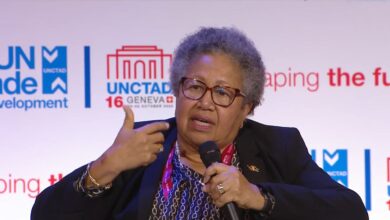(CARICOM Secretariat, Turkeyen, Greater Georgetown, Guyana) The crafting of the Caribbean Community’s response to the rapidly changing international and hemispheric environment and acknowledgement of the shifting priorities of CARICOM’s traditional partners, are among the issues regional Ministers of Foreign Affairs must tackle during the Council for Foreign and Community Relations (COFCOR) Meeting now underway in Antigua and Barbuda.
Delivering opening remarks at the 11th COFCOR Meeting on 8 May 2008, CARICOM Secretary-General H.E. Edwin Carrington referred to the changing global environment and said Ministers would be called upon to determine how the Region responded to accompanying challenges, what new initiatives the Region could mount and what mechanisms it needed to put in place to attain the Community’s objectives.
“Paramount among the challenges is the Community’s need to respond to the redistribution of power and influence on the global stage. This redistribution has resulted in part, though not in whole, from the growing importance of countries such as the People’s Republic of Chine, Brazil and India,” the Secretary-General said.
In addition, he said that the Community must be aware of and alert and responsive to the shifting priorities of its traditional partners. He cited Canada as an example, and noted that it had significantly enhanced its support to the Region to the tune of about Cdn$600M over the next decade, but had placed much stronger emphasis on the integration process as represented by CARICOM.
“Also, though the Region continues to enjoy friendly relations with the United Kingdom and with the United States of America, born of longstanding political, economic, trading and social ties, those relationships have shifted emphasis towards security in the case of the United States and from a preferential, to a reciprocal trading relationship, in the case of the United Kingdom, as part of the European Union-CARIFORUM Economic Partnership Agreement,” Mr. Carrington said.
The Economic Partnership Agreement (EPA) he said, may have compromised the objective of strengthening historical links which the Community had established with countries of Africa and the Pacific during the periods of the Lome and Cotonou Agreements.
He also referred to the new relations being developed in Latin America and with non-traditional partners, and pointed out that the Community had positively responded to the interests shown by emerging development partners in Europe – Spain, Italy and Austria in particular – and opportunities that have also opened up with Japan and South Korea.
But while he lauded the new and continuing foreign relations, the Secretary-General cautioned against neglecting Community Relations.
“Let us never underestimate the importance of strengthening ties among Member States of the Community. It is critical for the very survival of our Region as an integration movement – Solidarity like Charity, must begin at home!
“If some members of the Community were to feel for any reason that their interests are ignored or marginalised, that will undoubtedly lead to a weakened Community. Equally, if relations between various Member States were to become strained that too can weaken and threaten the very survival of our Community; and if our Community is to be as our Heads of Government so aptly designated it in Barbados at their last Meeting in July, as “A Community for All”, then not only must the interests of all be served, but all must feel that their interests are being served – and the all refers to the people of all, the Secretary-General said.





